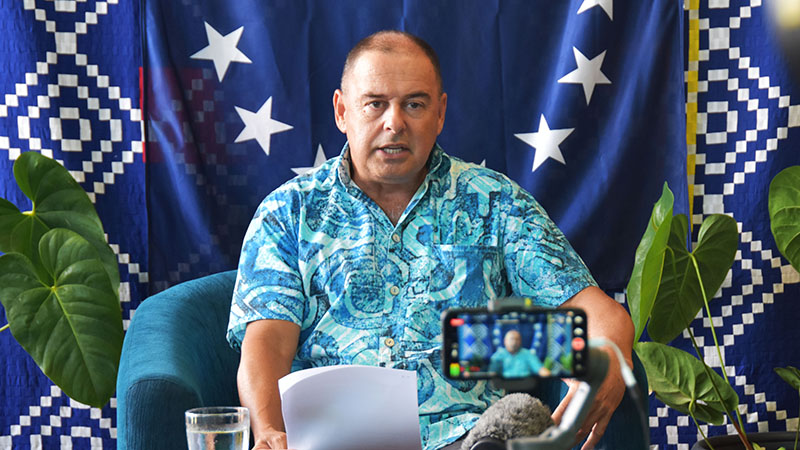PM calls for virtual voting at COP26
Wednesday 3 November 2021 | Written by RNZ | Published in National, Politics

Prime Minister Mark Brown. SUPPLIED/21011409
Cook Islands Prime Minister Mark Brown has come out swinging at the United Nation's COP26 summit.
Global climate talks have started in Glasgow, Scotland but most Pacific leaders can’t get there.
While the leaders of four Pacific nations are attending the United Nation’s COP26 summit, Covid-19 travel restrictions are preventing the leaders of 10 Pacific nations from attending with their delegates.
PM Mark Brown is one, and he said it was verging on hypocrisy that Pacific countries are denied a voice unless they attend in person.
“I would have been committed to go to Glasgow as one of the climate change champions for finance for the Pacific, but the situation, of course, with the outbreak in New Zealand - the travel restrictions meant that I could possibly be locked out of my own country for a period of time that wasn’t acceptable,” he said.
“We are pushing very hard to ensure that even though we not be personally out there, our message needs to be heard loud and clear.”
Brown said COP26 organisers should allow virtual voting.
“We’ve come through two years of attending virtual meetings with the Covid situation, the inability to travel.
“At this late stage for a very important meeting which heavily impacts Pacific countries, to be denied a voice unless we are there in person is verging on hypocrisy.
“If our voices are not going to be heard, if we are not going to be able to participate virtually at these meetings then we will use the normal media to get our voices heard.”
PM Brown said the Cook Islands’ Europe-based representative will go to COP26 while he and his team will be pushing their climate messages hard from home.
He said Cook Islands was in a difficult position in terms of obtaining finance to build resilience.
Covid-19 had added burden to countries that were already debt stressed, he said.
“We are coming off the back of Covid, for many Pacific Island states there is the issue of development finance that we need to build our economies and lift the standard of living for our people.
“We are in a very very difficult position of trying to get finance to build resilience, some of it is to do with withstanding the impacts of more severe storms, far heavier rainfalls increased periods of drought, all the impacts of climate change.”
Leaders from Papua New Guinea, Fiji, Tuvalu and Palau are attending the summit.
But Covid-19 travel restrictions have grounded the leaders of 10 Pacific nations – the Cook Islands, Federated States of Micronesia, Kiribati, Solomon Islands, Vanuatu, Tonga, Samoa, Nauru, Marshall Islands, and Niue.
Meanwhile, travellers heading to Glasgow have been left stranded by major rail disruption caused by “intense storms”.
Hundreds of people were left waiting at London’s Euston station after fallen trees caused all trains to be suspended.
At the G20 summit in Rome, the leaders of the world’s richest economies have agreed to pursue efforts to limit global warming with “meaningful and effective actions”.
But the agreement made few concrete commitments, disappointing activists.
Oscar Soria, of the activist network Avaaz, said there was “little sense of urgency” coming from the group, adding: “There is no more time for vague wish-lists, we need concrete commitments and action.”
Host nation Italy had hoped that firm targets would be set before COP26.
British prime minister Boris Johnson said leaders’ promises without action were “starting to sound hollow”.
The G20 group, made up of 19 countries and the European Union, accounts for 80 percent of the world’s emissions.
The communiqué, or official statement released by the leaders, also makes no reference to achieving net zero by 2050.
Net zero means reducing greenhouse gas emissions until a country is absorbing the same amount of emissions from the atmosphere that it is putting out.
Italian Prime Minister Mario Draghi did, however, say in his closing statement that all of the G20 countries are committed to reaching the target by the mid-century.
Scientists have said this must be achieved by 2050 to avoid a climate catastrophe, and most countries have agreed to this.















































